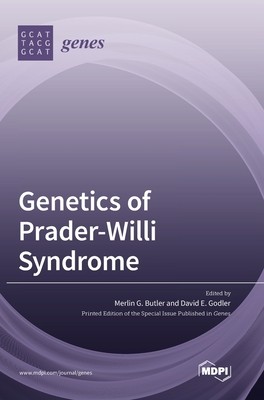
- We will send in 10–14 business days.
- Publisher: MDPI AG
- ISBN-10: 3036550259
- ISBN-13: 9783036550251
- Format: 17 x 24.4 x 1.9 cm, hardcover
- Language: English
- SAVE -10% with code: EXTRA
Genetics of Prader-Willi Syndrome (e-book) (used book) | bookbook.eu
Reviews
Description
Prader-Willi syndrome (PWS) is a complex genomic imprinting disorder associated with a spectrum of medical, cognitive, behavioural, and psychiatric problems and is also the most common cause of life-threatening obesity that can be effectively treated with hormone therapy and restricted diet, if detected early. PWS is usually caused by the loss of the paternally inherited 15q11.2-q13 region and abnormal expression of genes within that region and beyond. While some genotype-phenotype correlations with delineation of clinical characteristics and natural history have emerged when comparing the three main molecular classes of PWS (maternal uniparental disomy (UPD) 15, imprinting centre defect, and deletion of paternal 15q11-q13), better awareness and informative biomarkers are still needed. These could facilitate early diagnosis, counseling, prognostic testing, as well as patient stratification for clinical trials, to improve outcomes for the affected children and their families.
This Special Issue will comprise reviews and original research articles focused on the recent advances of genetics/genomics, testing, and epigenetic processes along with clinical description, co-morbidities, and natural history of PWS. Current and future directions with focus on improved screening, diagnosis, and treatment will be addressed in this rare neurodevelopmental genetic imprinting disorder influenced by the PWS genetic subtypes.
- Publisher: MDPI AG
- ISBN-10: 3036550259
- ISBN-13: 9783036550251
- Format: 17 x 24.4 x 1.9 cm, hardcover
- Language: English English
Prader-Willi syndrome (PWS) is a complex genomic imprinting disorder associated with a spectrum of medical, cognitive, behavioural, and psychiatric problems and is also the most common cause of life-threatening obesity that can be effectively treated with hormone therapy and restricted diet, if detected early. PWS is usually caused by the loss of the paternally inherited 15q11.2-q13 region and abnormal expression of genes within that region and beyond. While some genotype-phenotype correlations with delineation of clinical characteristics and natural history have emerged when comparing the three main molecular classes of PWS (maternal uniparental disomy (UPD) 15, imprinting centre defect, and deletion of paternal 15q11-q13), better awareness and informative biomarkers are still needed. These could facilitate early diagnosis, counseling, prognostic testing, as well as patient stratification for clinical trials, to improve outcomes for the affected children and their families.
This Special Issue will comprise reviews and original research articles focused on the recent advances of genetics/genomics, testing, and epigenetic processes along with clinical description, co-morbidities, and natural history of PWS. Current and future directions with focus on improved screening, diagnosis, and treatment will be addressed in this rare neurodevelopmental genetic imprinting disorder influenced by the PWS genetic subtypes.


Reviews